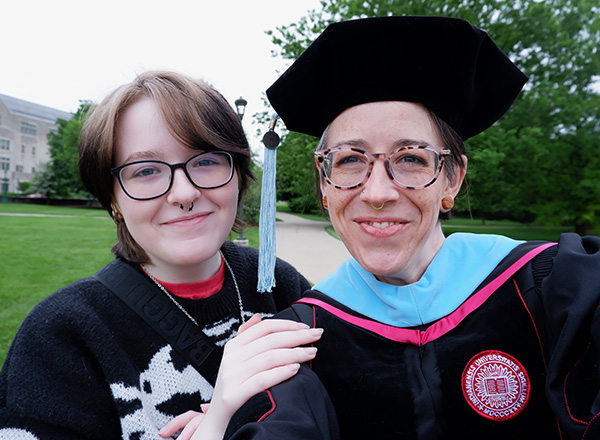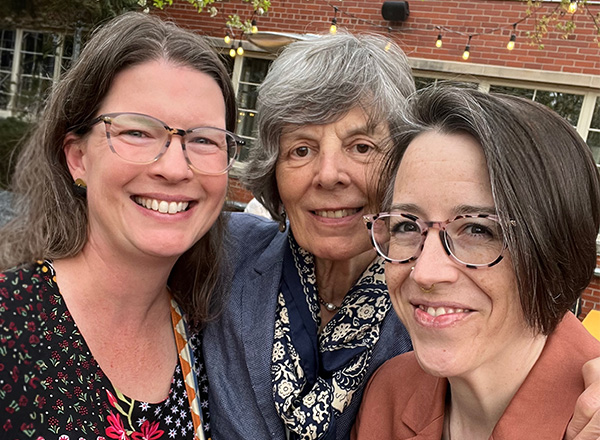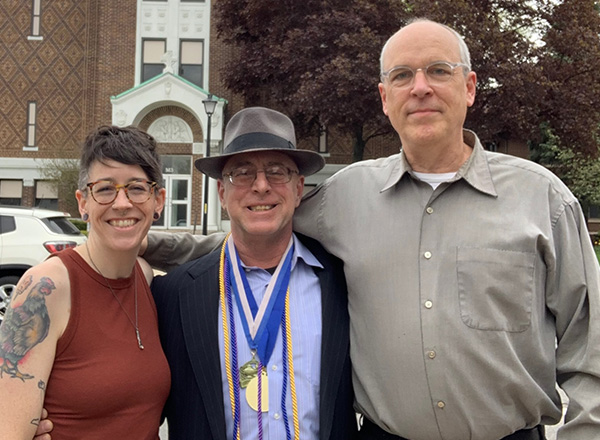Get to Know HFC: Dr. Chelsea Lonsdale’s full-circle journey at the College

HFC English instructor Dr. Chelsea Lonsdale never intended to go into teaching.
Her initial interest was in photojournalism. Then she took a class with HFC English instructor Dr. John Rietz when she was a student at HFC (then Henry Ford Community College). The experience changed her life path.
“I thought he was a great professor,” recalled Lonsdale. “He was kind and encouraging and one of the few people in my life who supported me when I was pregnant with my daughter. He believed in me and in my future when I couldn’t always see it. I remember thinking, ‘I want to be that guy when I grow up.’”
Her father’s HFC diploma is displayed in her office
The eldest of two daughters, Lonsdale was born and raised in Dearborn. She lives in Plymouth with her daughter, who plans to attend HFC next year.
HFC has a special place in Lonsdale’s heart. Her late father, Michael Lonsdale, is a 1974 alumnus who earned an associate degree in automotive technology. His diploma is proudly displayed in Lonsdale’s office. At his recommendation, she began taking photography classes at HFC through community education when she was as young as 13.
After graduating from Edsel Ford High School, Lonsdale enrolled at HFC, working toward what was the precursor of the Michigan Transfer Agreement (MTA). She also completed coursework at Washtenaw Community College in Ann Arbor.
Lonsdale eventually transferred to Eastern Michigan University, where she is a 2-time alumna. She earned her bachelor’s degree with departmental honors in Literature, Language, and Writing. She subsequently earned her master’s degree in Written Communication: Teaching of Writing. In early May 2024, Lonsdale earned her doctorate in Literacy, Culture, and Language Education from Indiana University Bloomington.
As an undergrad student at EMU, Lonsdale worked in the University Writing Center and was an advocate for student parents in the Women’s Resource Center. While pursuing her undergraduate and graduate degrees, she worked closely with EMU English professor Dr. Elisabeth Däumer on the Muriel Rukeyser Living Archive, a project that features the poetry and writing of Rukeyser, along with other scholarship and pedagogical resources. Lonsdale has even taught Rukeyser’s The Book of the Dead at HFC.
“My time at EMU prepared me well to teach at the community college level,” said Lonsdale. “I think it’s rare to find a graduate program that recognizes community college teaching as a valid career choice. There are many EMU alumni who teach English at HFC, and I am proud to be one of them!”
An expert and an advocate in the classroom and community
Lonsdale has been teaching at the community college level since 2012. After earning her master's degree from EMU, she taught at Monroe County Community College for a summer before she was hired as a full-time faculty member at HFC in 2015, where she teaches college-level and developmental reading and writing, including:
- Academic Literacies
- Accelerated Learning Program (ALP) – Reading and Writing
- Introduction to College Writing
- College Writing and Research
Lonsdale has served as the faculty director of the Writing Center since 2019, which she co-founded with fellow English instructor Dr. Michael Hill. Lonsdale also serves as the faculty advisor of the Sexuality and Gender Acceptance (SAGA) Club, HFC’s LBGTQ+ student organization. She reports to Pamela Stewart, the Associate Dean of the HFC School of Liberal Arts.
“Chelsea is unusually intelligent with a very quick mind. With her master’s and doctoral degrees, she has made herself a true expert on teaching post-secondary reading and writing,” said Rietz. “She was a student at HFC herself and has an authentic, personal concern for our students' success and well-being. Chelsea is such an invaluable asset to the College; I think very highly of her.”
“Voices from the Underbelly”
It took Lonsdale four years to complete her doctorate through an online program designed for working teachers. It was an intensive program with a pedagogical focus and an emphasis on practitioner inquiry.
“I wanted to study education and literacy specifically because I felt it would make me a better teacher and a better director of the Writing Center,” she explained. “Literacy is also something I value personally, so it was a meaningful experience all around.”
Lonsdale’s dissertation was called “Voices from the Underbelly: Community College English Faculty Experiences with Developmental Education Reform.” Her research was inspired by her experience with Michigan Reconnect, a program providing in-district tuition at no cost for Michigan residents aged 25 and older who do not have a college degree.
“While Michigan Reconnect is a great program, it also came with stipulations for funding that changed how we teach gateway courses. Faculty expertise was not sufficiently included in those policymaking conversations. I wanted to amplify the voices of the faculty,” she explained. “My involvement with Michigan Reconnect was encouraged by John McDonald, who asked for a member of Local 1650 to represent the American Federation of Teachers in a workgroup tasked with making placement recommendations. My dissertation wouldn’t have been possible if it weren’t for John's phone call.”
As part of her doctoral studies, Lonsdale completed coursework in Adult Education with IU education professor Dr. Amy Pickard, a renowned qualitative researcher whose interests center on policy, equity, and adult literacy education.
She also taught reading literacy skills to college students in India online during the pandemic in a program called Virtual Academic Readiness Bootcamp under the direction of IU education professor Dr. Sharon Daley. Both Pickard and Daley were on Lonsdale’s dissertation committee.
A new professional identity
Stewart appreciates Lonsdale's devotion to educating students.
"Chelsea is a passionate educator whose creativity and kindness enrich the HFC environment in a variety of ways," said Stewart. "As Writing Center director, she has expanded a much-needed student success resource that provides a safe, welcoming environment for employees and students to seek out support for their academic and personal writing, both in-person and online. She was also involved in developing and teaching a co-requisite academic literacy support course for students enrolling in liberal arts classes with heavy reading and writing demands."
“Earning my doctorate changed who I am as a teacher. I moved from what was essentially a composition and rhetoric background into education, and now I can draw upon both of those disciplines to form a new professional identity,” said Lonsdale.
Perhaps the highlight of her doctoral research was the opportunity to interview her grandmother, Louise Doute, for a class on feminist research methodologies.
“I loved that my doctorate connected so many of my interests. I’ve always been interested in people’s stories and how they tell them. This informs the research I did and the teaching that I do. My grandmother has an incredible memory, so to sit alongside her and listen to the stories she wanted to tell was a personally significant experience and a perfect ending to my graduate coursework,” said Lonsdale.
Community colleges as the cornerstone of post-secondary education
Now that her doctorate is completed, Lonsdale is looking forward to spending more time with her daughter over the summer and has rediscovered her interest in photography. This fall, she will collaborate with HFC Director of Theatre Dr. John Michael Sefel on HFC’s production of Dear Harvey.
“It’s been a long time since I’ve done anything with theatre,” said Lonsdale. “I’m excited to work with Dr. Sefel on this production, which is a story-focused docudrama that celebrates the accomplishments of LGBTQ+ activist and politician Harvey Milk. You can see how that fits in nicely with the values I hold.”
Lonsdale is also a strong advocate for the open access mission of community colleges and for community college faculty as teachers and scholars whose voices and experiences are integral to their fields.
“Community colleges are the cornerstone of post-secondary education. They make post-secondary education accessible, and for students who don’t fit easily within the traditional university model, that’s huge. Community colleges are a place to find your voice, a place to figure out the next step in your life, and a place to explore,” explained Lonsdale. “For me, attending a community college gave me a place to figure out who I was and who I would become. It also gave me the language to tell my story. It was the people I met while I was a student who saw my potential and encouraged me to keep going.”
The ability to help students develop their voice and path is a critical component of why she loves teaching.
“I like helping students develop their academic voices and learn to engage more critically with their own lives and with the world around them. I especially enjoy teaching non-traditional students, adults who are returning to school at a later age, after working or raising children. I enjoy seeing struggling students succeed and watching their relationship to education change positively,” she said. “My colleagues are good people doing good work. I am fortunate to be among their kind. Many of them were my teachers and now they’re my colleagues and – truthfully – some of my closest friends.”

